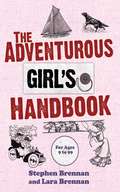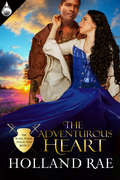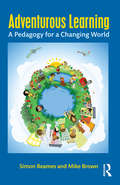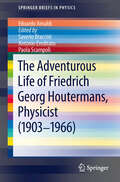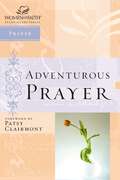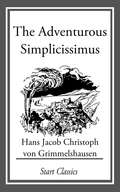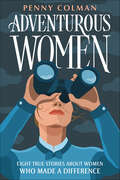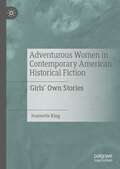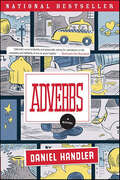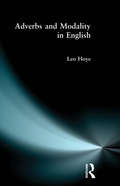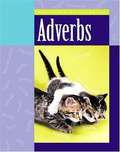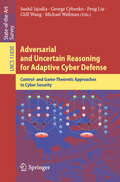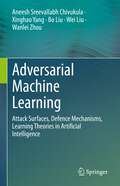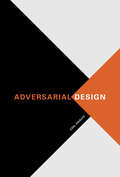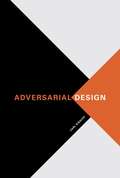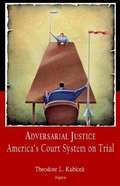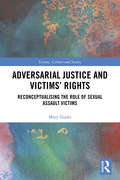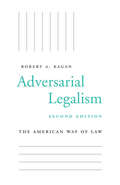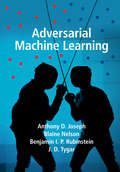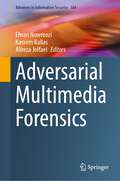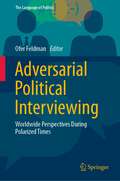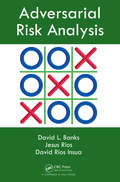- Table View
- List View
The Adventurous Gardener
by Christopher Lloyd'The best informed, liveliest and most innovative gardening writer of our times' GUARDIAN'Christopher Lloyd ranks with Gertrude Jekyll and Vita Sackville-West as one of the major figures in twentieth-century British gardening' THE TIMESIn this gardening classic the forever adventurous Christopher Lloyd takes us on a tour through the garden, to encourage, to reveal and to overturn the old and accepted when experience prompts him. He advises on cuttings, pruning, the art of compromise and takes another look at Miss Jekyll. Gardening was a passion, and throughout his life he developed Great Dixter to be one of Britain's greatest gardens. For Christo gardening is nothing if not fun and - pointing out that 'to be roused into an argumentative frame of mind is in itself no bad thing' - he makes it equally stimulating and enjoyable for his readers.
The Adventurous Girl's Handbook: For Ages 9 to 99
by Stephen Brennan Lara BrennanAn adventurous girl is a force to be reckoned with. This is the adventurer's guide to navigating the road of girlhood with style, grace, and most of all, fun. It's also packed with the most valuable skills, secrets. and age-old wisdom ever assembled for the modern girl.Horseback riding, ballet dancing, throwing the most unforgettable slumber party ever, and dealing with boys, playing sports and enjoying the outdoors: these are the things that girls want, and need, to know. The Adventurous Girl's Handbook is a treat--pick it up again and again for a new lesson in decorating with beads, pressing flowers, or decorating your bedroom with the hottest styles. Here is the perfect book for smart, adventurous girls of all ages!
The Adventurous Heart
by Holland RaePreviously published (2015) Amazon. When Andrea DuPonte Morgan left England at only sixteen years of age, he had no plan of ever returning. The legal son of a country lord and his clandestinely married African servant, Andrea could see no future for himself there. Twelve years later, he is a leading explorer in the American islands, ready to embark upon the greatest adventure of his life -- the quest for the lost treasure of Francisco Coronado. But when he can no longer fund the trip, Andrea is faced with a choice: Does he forsake his explorer's legacy, or does he return to the shores of England, where the late Lord Morgan has bequeathed him the entire estate, even if it requires coming face-to-face with everything he left behind? And if he does return, who will be waiting for him there?Lady Georgina Wyndham would go to any measure to protect her young sister Iris, even if it requires sacrificing her own dowry so Iris never knows the extent of their father's gambling and drinking debt. Any measure includes the reopening of her father's defunct solicitor's firm, a means of staving off their encroaching poverty. But as Georgina wrestles with her own disadvantages as a woman, she is soon forced to confront the disadvantages of another. In a moment of desperation, she accepts a job that could keep both Iris and her safe -- if it doesn't ruin her first. This case is by far the most difficult she has ever had to manage, but through its course, Georgina might just learn that there is more to her strange and worldly client than meets the eye, and that real treasure can be found in the most unlikely of places.
Adventurous Learning: A Pedagogy for a Changing World
by Mike Brown Simon BeamesAdventurous Learning interrogates the word ‘adventure’ and explores how elements of authenticity, agency, uncertainty and mastery can be incorporated into educational practices. It outlines key elements for a pedagogy of adventurous learning and provides guidelines grounded in accessible theory. Teachers of all kinds can adapt these guidelines for indoor and outdoor teaching in their own culturally specific, place-responsive contexts, without any requirement to learn a new program or buy an educational gimmick. As forces of standardization and regulation continue to pervade educational systems across the globe, both teaching and learning have been starved of creativity, choice and ‘real world’ relevance. Many teachers are keen to improve their practice yet feel constrained by the institutional structures within which they work. By carefully examining adventure and its role in education, teachers can become better able to design and deliver engaging programmes that are underpinned by sound pedagogical principles, and which have deep and enduring meaning for their students.
The Adventurous Life of Friedrich Georg Houtermans, Physicist (1903-1966)
by Edoardo Amaldi Antonio Ereditato Paola Scampoli Saverio BracciniThe physicist Friedrich Houtermans (1903-1966) was an essential promoter and proponent of the development of physics in Berne. He introduced a number of activities in the field of elementary particles, with a special focus on the physics of cosmic rays, and important contributions in applied physics. This biography of Houtermans was written by Edoardo Amaldi and was almost finished just before his unexpected death in 1989. The editors have only corrected typographical errors and have introduced only minimal text changes in order to preserve the original content. Additionally they have collected and included unpublished pictures and memories from Houtermans' students and collaborators. The text is the result of a thorough and intensive study on Houtermans' life and character carried out by Edoardo Amaldi. It is more than a biography, since the figure of Houtermans is set in a historical perspective of Europe between the two world wars. This book will be of great interest to historians and historians of science.
Adventurous Prayer (Women of Faith Study Guide Series)
by ZondervanThese topical guides will deal with issues that women wrestle with today: God's Will, Living in Christ, Prayer, and Worry. Reaching an audience across race, socio-economic, denominational, and age boundaries, these guides will enhance the lives of women in America as they empower them in their weekly devotions. The study guides can be used for both individual and group settings. Women are asking good questions about their faith. With our study guides, we want to join them in their quest for knowledge and lead them in finding the answers they are seeking.
The Adventurous Simplicissimus
by Hans Jacob von GrimmelshausenThe novel follows a boy from the Spessart named Simplicius in the Holy Roman Empire during the 30 Years War as he grows up in the depraved environment and joins the armies of both warring sides, switching allegiances several times. Born to an illiterate peasant family, he is separated from his home by foraging dragoons and is eventually adopted by a forest hermit. He is conscripted at a young age into service, and from there embarks on years of foraging, military triumph, wealth, prostitution, disease, travels to Russia, and countless other adventures.
Adventurous Women: Eight True Stories About Women Who Made aDifference
by Penny ColmanThe adventures of eight inspiring women of the twentieth century. <P><P> Mary Gibson Henry risked her life following her passion for new botanical species. During the Civil War, Katharine Wormeley worked aboard hospital ships and helped to save the lives of many sick and wounded soldiers. With a promise and a dollar and a half, Mary McLeod Bethune opened a school for African American girls in Daytona Beach, Florida, in 1904, at a time when schools were segregated. <P><P> Award-winning author Penny Colman offers a compelling collection of true stories about eight women who were bold enough to confront obstacles and take risks in the pursuit of their goals. This is a book that celebrates the intelligence, fortitude, and courage of women.
Adventurous Women: Eight True Stories About Women Who Made a Difference
by Penny ColmanThe adventures of eight inspiring women of the twentieth century.Mary Gibson Henry risked her life following her passion for new botanical species. During the Civil War, Katharine Wormeley worked aboard hospital ships and helped to save the lives of many sick and wounded soldiers. With a promise and a dollar and a half, Mary McLeod Bethune opened a school for African American girls in Daytona Beach, Florida, in 1904, at a time when schools were segregated. Award-winning author Penny Colman offers a compelling collection of true stories about eight women who were bold enough to confront obstacles and take risks in the pursuit of their goals. This is a book that celebrates the intelligence, fortitude, and courage of women.
Adventurous Women in Contemporary American Historical Fiction: Girls' Own Stories
by Jeannette KingThis book brings together for the first time nine groundbreaking historical novels by women from the United States, Canada and Latin America, united by their focus on female adventurers. These novels introduce the neglected women of history, real and imagined, who accompanied their menfolk to the New World, and enabled its settlement or colonisation. Familiar novelists include Isabel Allende, Audrey Thomas and Jane Smiley, but this book also introduces less familiar writers who have produced richly textured and densely historical novels. In addition to putting women back into history, these writers engage with the literature of the past, including the American canon of male fiction which dominated literary history before the intervention of feminist scholars. The book begins with an introduction to the history of historical fiction and provides a theoretical, historical and geographical context for the novels themselves.
Adverbs: A Novel
by Daniel HandlerHello.I am Daniel Handler, the author of this book. Did you know that authors often write the summaries that appear on their book's dust jacket? You might want to think about that the next time you read something like, "A dazzling page-turner, this novel shows an internationally acclaimed storyteller at the height of his astonishing powers."Adverbs is a novel about love -- a bunch of different people, in and out of different kinds of love. At the start of the novel, Andrea is in love with David -- or maybe it's Joe -- who instead falls in love with Peter in a taxi. At the end of the novel, it's Joe who's in the taxi, falling in love with Andrea, although it might not be Andrea, or in any case it might not be the same Andrea, as Andrea is a very common name. So is Allison, who is married to Adrian in the middle of the novel, although in the middle of the ocean she considers a fling with Keith and also with Steve, whom she meets in an automobile, unless it's not the same Allison who meets the Snow Queen in a casino, or the same Steve who meets Eddie in the middle of the forest. . . . It might sound confusing, but that's love, and as the author -- me -- says, "It is not the nouns. The miracle is the adverbs, the way things are done." This novel is about people trying to find love in the ways it is done before the volcano erupts and the miracle ends. Yes, there's a volcano in the novel. In my opinion a volcano automatically makes a story more interesting.
Adverbs and Modality in English (English Language Ser. #No. 21)
by Leo HoyeThis new study on modality in English represents a departure from more traditional approaches to the subject, where the modal auxiliaries have been the usual focus of attention, by examining in detail the nature of their association with different categories of modal adverb. Modality is notoriously complex but the present work offers an accessible introduction to the topic, a comprehensive account of modal-adverb co-occurrence, and a reappraisal of the English modal system. The descriptive framework draws fresh insights from syntactic, semantic and pragmatic approaches to the study of language and communication, and from recent work in corpus linguistics. The book includes contrastive reference to the expression of modality in Spanish and a discussion of modality in such applied contexts as language teaching. A major feature is its reliance on authentic spoken and written language data. The study is suitable for undergraduate and postgraduate students of linguistics, English language, communications studies and related disciplines.
Adverbs (The Magic of Language)
by Ann HeinrichsNo matter if you read quickly or slowly, or whether you start off grumpily or happily, you will surely have a smile on your face once you've learned about adverbs. This book will help young readers identify adverbs and use them in writing and speaking. Adverbs just make reading more fun!
Adversarial and Uncertain Reasoning for Adaptive Cyber Defense: Control- and Game-Theoretic Approaches to Cyber Security (Lecture Notes in Computer Science #11830)
by Sushil Jajodia George Cybenko Peng Liu Cliff Wang Michael WellmanToday’s cyber defenses are largely static allowing adversaries to pre-plan their attacks. In response to this situation, researchers have started to investigate various methods that make networked information systems less homogeneous and less predictable by engineering systems that have homogeneous functionalities but randomized manifestations. The 10 papers included in this State-of-the Art Survey present recent advances made by a large team of researchers working on the same US Department of Defense Multidisciplinary University Research Initiative (MURI) project during 2013-2019. This project has developed a new class of technologies called Adaptive Cyber Defense (ACD) by building on two active but heretofore separate research areas: Adaptation Techniques (AT) and Adversarial Reasoning (AR). AT methods introduce diversity and uncertainty into networks, applications, and hosts. AR combines machine learning, behavioral science, operations research, control theory, and game theory to address the goal of computing effective strategies in dynamic, adversarial environments.
Adversarial Deep Learning in Cybersecurity: Attack Taxonomies, Defence Mechanisms, and Learning Theories
by Bo Liu Wei Liu Wanlei Zhou Aneesh Sreevallabh Chivukula Xinghao YangA critical challenge in deep learning is the vulnerability of deep learning networks to security attacks from intelligent cyber adversaries. Even innocuous perturbations to the training data can be used to manipulate the behaviour of deep networks in unintended ways. In this book, we review the latest developments in adversarial attack technologies in computer vision; natural language processing; and cybersecurity with regard to multidimensional, textual and image data, sequence data, and temporal data. In turn, we assess the robustness properties of deep learning networks to produce a taxonomy of adversarial examples that characterises the security of learning systems using game theoretical adversarial deep learning algorithms. The state-of-the-art in adversarial perturbation-based privacy protection mechanisms is also reviewed. We propose new adversary types for game theoretical objectives in non-stationary computational learning environments. Proper quantification of the hypothesis set in the decision problems of our research leads to various functional problems, oracular problems, sampling tasks, and optimization problems. We also address the defence mechanisms currently available for deep learning models deployed in real-world environments. The learning theories used in these defence mechanisms concern data representations, feature manipulations, misclassifications costs, sensitivity landscapes, distributional robustness, and complexity classes of the adversarial deep learning algorithms and their applications. In closing, we propose future research directions in adversarial deep learning applications for resilient learning system design and review formalized learning assumptions concerning the attack surfaces and robustness characteristics of artificial intelligence applications so as to deconstruct the contemporary adversarial deep learning designs. Given its scope, the book will be of interest to Adversarial Machine Learning practitioners and Adversarial Artificial Intelligence researchers whose work involves the design and application of Adversarial Deep Learning.
Adversarial Design (Design Thinking, Design Theory)
by Carl DisalvoAn exploration of the political qualities of technology design, as seen in projects that span art, computer science, and consumer products.In Adversarial Design, Carl DiSalvo examines the ways that technology design can provoke and engage the political. He describes a practice, which he terms “adversarial design,” that uses the means and forms of design to challenge beliefs, values, and what is taken to be fact. It is not simply applying design to politics—attempting to improve governance for example, by redesigning ballots and polling places; it is implicitly contestational and strives to question conventional approaches to political issues. DiSalvo explores the political qualities and potentials of design by examining a series of projects that span design and art, engineering and computer science, agitprop and consumer products. He views these projects—which include computational visualizations of networks of power and influence, therapy robots that shape sociability, and everyday objects embedded with microchips that enable users to circumvent surveillance—through the lens of agonism, a political theory that emphasizes contention as foundational to democracy. DiSalvo's illuminating analysis aims to provide design criticism with a new approach for thinking about the relationship between forms of political expression, computation as a medium, and the processes and products of design.
Adversarial Design
by Carl DisalvoIn Adversarial Design, Carl DiSalvo examines the ways that technology design can provoke and engage the political. He describes a practice, which he terms "adversarial design," that uses the means and forms of design to challenge beliefs, values, and what is taken to be fact. It is not simply applying design to politics--attempting to improve governance for example, by redesigning ballots and polling places; it is implicitly contestational and strives to question conventional approaches to political issues. DiSalvo explores the political qualities and potentials of design by examining a series of projects that span design and art, engineering and computer science, agitprop and consumer products. He views these projects-- which include computational visualizations of networks of power and influence, therapy robots that shape sociability, and everyday objects embedded with microchips that enable users to circumvent surveillance--through the lens of agonism, a political theory that emphasizes contention as foundational to democracy. Each of these projects engages one of three categories as a medium--information, robots, and ubiquitous computing--and in each of them certain distinctive qualities of computation are used for political ends or to bring forth political issues. DiSalvo's illuminating analysis aims to provide design criticism with a new approach for thinking about the relationship between forms of political expression, computation as a medium, and the processes and products of design.
Adversarial Justice: America's Court System on Trial
by Theodore L. KubicekOh, those lawyers! <P><P>The legal profession in fact, the legal system certainly has a poor reputation in the United States. Proposed remedies, however, rarely go as deep as the ethics of the system. America's judicial system should not be a game that anyone can win, regardless of actual guilt or liability. Ted Kubicek, JD, describes the problems and proposes solutions. Above all, he condemns the adversary system of justice which is used to evade the truth and which makes winning the paramount goal. <P><P>Dr. Kubicek postulates that the attorney-client privilege of communication makes the truth more difficult, even impossible, to determine. The adversary system goes hand in hand with the privilege of communication since neither can exist without the other. <P><P>He advocates moving instead to an inquisitorial system, in which truth is the goal of both parties, not just of the party that would gain thereby. He then shows how the elimination of adversaryism would automatically remedy other problems endemic to the system of justice, too, such as the passiveness of trial judges and juries. <P><P>Scrapping the adversary system would abolish trial and pretrial procedures and evidentiary rules that confuse law enforcement and trial participants alike. Criminal verdicts would not then depend upon confusing evidentiary or technical matters having no connection to the guilt or innocence of the accused. <P><P>This book is intended to encourage the legal profession, the judiciary, and the organized bar to remedy America's counter-productive judicial procedures. The argument will also interest anyone who has ever had to go to trial.
Adversarial Justice and Victims' Rights: Reconceptualising the Role of Sexual Assault Victims (Victims, Culture and Society)
by Mary IliadisThe rights, status and treatment of sexual assault victims has emerged as a significant 21st-century concern, occupying the forefront of legal commentary on international policy agendas. This book explores the extent to which reforms that offer victims enhanced rights to information and participation across England and Wales, Ireland and South Australia can address sexual assault victims’ procedural and substantive justice concerns. Informed by the voices of 26 high-level criminal justice professionals, legal stakeholders and victim support workers, and a quantitative dataset, this book also considers whether legal representation can address some of the problems of the prosecution process for sexual assault victims in Victoria and, indeed, in other adversarial jurisdictions that employ similar legislative frameworks. While acknowledging the value of victim-focused reforms, this book contends that cultural changes to the ways in which sexual assault victims are perceived and treated are necessary in order to improve victims’ experiences of the legal process. Reconceptualising the role of sexual assault victims from ‘witnesses’ to ‘participants’ will also increase the likelihood that victims’ rights and interests will be considered alongside those of the state and the accused. This book situates its findings within broader debates about the role, rights and treatment of sexual assault victims in adversarial justice systems and outlines prospects for the transfer of policy and practice between jurisdictions. Adversarial Justice and Victims’ Rights will interest academic and policy stakeholders engaged in criminology, law and socio-legal studies, as well as undergraduate and postgraduate students researching sexual violence and victims’ access to justice.
Adversarial Legalism: The American Way of Law, Second Edition (California Series In Law, Politics, And Society Ser. #1)
by Robert A. KaganAmerican dispute resolution is more adversarial, compared with systems of other economically advanced countries. Americans more often rely on legal threats and lawsuits. American laws are generally more complicated and prescriptive, adjudication more costly, penalties more severe. Here, Kagan examines the origins and consequences of this system.
Adversarial Machine Learning
by Anthony D. Joseph Blaine Nelson Benjamin I. Rubinstein J. D. TygarWritten by leading researchers, this complete introduction brings together all the theory and tools needed for building robust machine learning in adversarial environments. Discover how machine learning systems can adapt when an adversary actively poisons data to manipulate statistical inference, learn the latest practical techniques for investigating system security and performing robust data analysis, and gain insight into new approaches for designing effective countermeasures against the latest wave of cyber-attacks. Privacy-preserving mechanisms and the near-optimal evasion of classifiers are discussed in detail, and in-depth case studies on email spam and network security highlight successful attacks on traditional machine learning algorithms. Providing a thorough overview of the current state of the art in the field, and possible future directions, this groundbreaking work is essential reading for researchers, practitioners and students in computer security and machine learning, and those wanting to learn about the next stage of the cybersecurity arms race.
Adversarial Multimedia Forensics (Advances in Information Security #104)
by Ehsan Nowroozi Kassem Kallas Alireza JolfaeiThis book explores various aspects of digital forensics, security and machine learning, while offering valuable insights into the ever-evolving landscape of multimedia forensics and data security. This book’s content can be summarized in two main areas. The first area of this book primarily addresses techniques and methodologies related to digital image forensics. It discusses advanced techniques for image manipulation detection, including the use of deep learning architectures to generate and manipulate synthetic satellite images. This book also explores methods for face recognition under adverse conditions and the importance of forensics in criminal investigations. Additionally, the book highlights anti-forensic measures applied to photos and videos, focusing on their effectiveness and trade-offs.The second area of this book focuses on the broader landscape of security, including the detection of synthetic human voices, secure deep neural networks (DNNs) and federated learning in the context of machine learning security. It investigates novel methods for detecting synthetic human voices using neural vocoder artifacts, and it explores the vulnerabilities and security challenges of federated learning in the face of adversarial attacks. Furthermore, this book delves into the realms of linguistic steganography and steganalysis, discussing the evolving techniques that utilize deep learning and natural language processing to enhance payload and detection accuracy.Overall, this book provides a comprehensive overview of the ever-evolving field of digital forensics and security, making it an invaluable resource for researchers and students interested in image forensics, machine learning security and information protection. It equips readers with the latest knowledge and tools to address the complex challenges posed by the digital landscape. Professionals working in this related field will also find this book to be a valuable resource.
Adversarial Political Interviewing: Worldwide Perspectives During Polarized Times (The Language of Politics)
by Ofer FeldmanThis book presents a collection of studies on political interviews in a variety of broadcast media worldwide. Following the growing scholarly interest in media talk as a dominant form of political communication in contemporary society, a number of eminent international scholars analyze empirical material from the discourse of public figures and interviewer–journalists to address questions related to the characteristics, conduct, and potential effects of political interviews. Chapters span a varied array of cultural contexts: the U.S.A., U.K., Israel, Japan, Italy, Turkey, Greece, Australia, Philippines, Finland, Brazil, Malaysia, Spain, Venezuela, Montenegro, and the European Community, enabling a comparison of the different structures and contents of political interviews in societies from West to East. Authors bring an interest in discourse and conversation analysis, as well as in rhetorical techniques and strategies used by both interviewers and interviewees, from different disciplinary viewpoints including linguistic, political, cultural, sociological, and social–psychological. In doing so, the book develops a framework to assess the extent to which media political interviews and talk shows, and regular news programs, play a central role in transmitting accurate and genuine political information to the general public, and how audiences can make sense of these programs’ output.
Adversarial Reasoning: Computational Approaches to Reading the Opponent's Mind (Chapman & Hall/CRC Computer and Information Science Series)
by Alexander Kott William M. McEneaneyThe rising tide of threats, from financial cybercrime to asymmetric military conflicts, demands greater sophistication in tools and techniques of law enforcement, commercial and domestic security professionals, and terrorism prevention. Concentrating on computational solutions to determine or anticipate an adversary's intent, Adversarial Reasoning:
Adversarial Risk Analysis
by David L. Banks Jesus M. Aliaga David Rios InsuaWinner of the 2017 De Groot Prize awarded by the International Society for Bayesian Analysis (ISBA)A relatively new area of research, adversarial risk analysis (ARA) informs decision making when there are intelligent opponents and uncertain outcomes. Adversarial Risk Analysis develops methods for allocating defensive or offensive resources against

